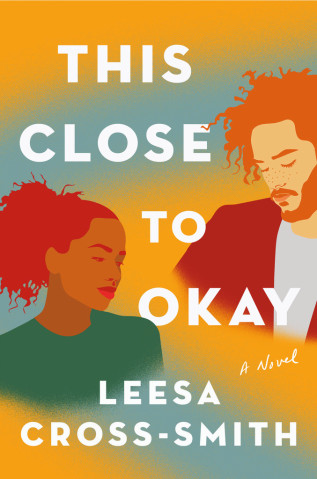
This Close to Okay
by Leesa Cross-Smith
lit fiction
Grand Central Publishing – February 2021
“I really like the writing. But we need something that’s more elevated. Something that’s high concept. You know what I’m saying, right?”
In the last year and a half, I’ve heard this phrase (or variations of it) tumble out the lips of more film/TV executives, literary agents, and publishers than I’d care to admit. No matter how many times I hear it, I always chafe at this vague “development-speak” way of passing on a submission. It feels like the coward’s way out—a generic, one-size-fits-all statement that they can throw out instead of saying how they actually feel.
If you actually liked the writing, you wouldn’t be passing on it, would you, you schmuck?
Despite my feelings about this fact, the industry professional desire for “high concept” material isn’t going anywhere anytime soon. In the entertainment and publishing landscapes, plot-driven, easy-to-pitch narratives are increasingly drowning out the appetite for “low concept” pieces—ones that are steered by the nuance of character and story-world instead. It’s a frustrating reality compelled by the craving of financial profit, and is bad news for writers and audiences searching for more grounded intimacy in their hardcovers or on their screens.
All of this makes the rousing success of a novel like This Close to Okay all the sweeter. It’s a story with a disarmingly simple, wholly low-concept premise: a recently divorced therapist (Callie), driving home from work one night, discovers a man (Emmett) about to commit suicide by jumping off a bridge. Callie talks Emmett off the ledge and takes him in. Over the course of a long weekend together, Callie and Emmett find in each other what they’ve been searching for most: the ability to heal from their respective psychological traumas.
Simply put, This Close to Okay is poignant, gorgeously crafted, and emotionally resonant writing that explores what it truly means to love, the intricate maze of mental health and depression, and what can happen if someone isn’t there to catch us when we fall. It’s a narrative that is nearly entirely character-driven, has no antagonist (other than Callie and Emmett’s internal demons), and is a giant middle finger to the axiom of the necessity of high-concept.
This Close to Okay is author Leesa Cross-Smith’s fourth published work and second novel. Published in February by Grand Central Publishing (Hachette), This Close to Okay has racked up nearly every single type of critical acclaim you can imagine. And, given the timing of its release—on the tail end of a global pandemic that has divided and isolated people more than ever before—its exploration of the restorative vitality of human connection couldn’t have been better placed. The novel feels like chicken soup for the soul but cooked by a Michelin-starred chef: equal parts homestyle comfort, no-frills familiarity, rich complexity, and thorough engagement of all sensibilities.
More to this end, This Close to Okay is a glorious case study for writers of any stripe—up-and-coming, newly established, or veteran—that meditative, subtle, character-based stories can work, and find both critical and commercial success. But if you are going to opt for that type of storytelling (and thus forgo the safety net that a more plot-driven narrative provides) the execution has to be flawless. Your readers cannot lose interest in your protagonists at any moment. They must surprise, enlighten, and engage at every turn.
While Cross-Smith achieves this is in a multitude of ways, probably the strongest exemplification is through the mystery of the secrets that Callie and Emmett are holding from one another. Without giving away any spoilers, both characters are lying about who they really are when they first meet. By placing Callie and Emmett’s relationship through this filter, Cross-Smith provides a really clever framework for the rest of the novel—as their friendship blossoms, so do the implications of their deception. It’s a storytelling device that not only adds intrigue and advances the curiosity of the reader, but also deepens the timbre of the novel’s exquisitely unpretentious yet highly relevant main theme—that without others, we are nothing.
Without a modicum of doubt, this novel will be named as one of the best books of 2021 in the end-of-year lists. You can count on it. It’s that good. It’s that moving. And it’s that important.
Most of all, though, with the en masse triumph of This Close to Okay, Cross-Smith has restored my faith in the aptitude of people in the industry—that they can clamor just as much for the low-concept as they do the high.
So thank you Leesa, from the bottom of my being. You’ve made the soul of this sometimes-disheartened creative sing with happiness and optimism once more.
